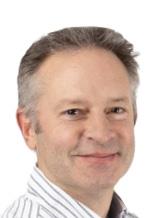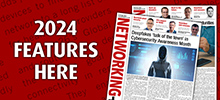09 August 2023

Robert Allen, director marketing & technical services, Kingston Technology
Which law would you most like to change?
The problem with all law is that it’s open to interpretation. People get embroiled in complex legal issues, regardless of the subject matter. Because their situation is so often not black and white, it requires the involvement of lawyers and that’s expensive. What I would change is not one law but the way the law is administered. I’m sure a computer could help with that.
What was your big career break?
At the start of my career, I was in the armed forces, in the Royal Army Ordnance Corps, based in Germany. I got some experience working with servers, secure email in my role as procurement and with confidential information. When I left after six years without any kind of strategic plan but a rudimentary knowledge of technology, I decided that I would put this to good use and taught myself more. I became a Certified Novell Networks Engineer and later a Microsoft Certified Systems Engineer. This took me to Deutsche Bank in a short-lived role, then on to a video conferencing company which led me to joining Kingston Technology. I think the army inadvertently gave me my career break, but it was a journey rather than one pivotal moment.
What did you want to be when you were growing up?
I didn’t have a specific plan, but I spent my education in a boarding school, my family were involved in the forces, and I think joining the army was a logical progression for me. I loved it. Everything about the army environment was so familiar to a boarding schoolboy and it helped me to grow up.
What’s the best piece of advice you’ve been given?
Three pieces of advice stand out. The first - don’t judge a book by its cover – always be open-minded. The second is to be prepared. If you do your due diligence you won’t have to wing it and that’s a benefit. And finally, don’t underestimate the task in hand.
If you had to work in a different industry, which would you choose?
Cooking. My mum doesn’t want to cook anymore, she’s had a lifetime of it, but I think she passed on her love of food to me. I like nothing more than bringing a group of people together and feeding them with something I’ve specially prepared with them in mind. It’s relaxing, enjoyable and requires skills I don’t use in my day-to-day job. If I was working with food I wouldn’t mind where and what type of cuisine because I have worldly tastes, but I would give more credit to traditional, straightforward British dishes or colonial dishes that no longer have the limelight. My mother taught me a simple dish called Chicken a la King which is all about timing and respecting the ingredients - just chicken, onions, peppers, mushrooms, a little stock, cream, salt, white pepper, and parsley to finish. If you know what you’re doing and cook it in stages, it can taste glorious.
The Rolling Stones or the Beatles?
Woah! They’re both great, but way before my time. I’m a fan of Prince and Grace Jones. I love their music, but also appreciate them as artists. I still laugh about Grace Jones scrapping with Russell Harty on his chat show.
Where would you live if money was no object?
It’s a good question, but isn’t money always an object? I’ve no desire to move abroad, although I love travelling, but it would be good to have somewhere with more room. I live in Hampton, the London suburb well known for Hampton Court Palace. Like many areas of London, it has a mixture of expensive and less expensive properties and some houses that back onto the river. If money was no object, I would probably stay in Hampton but look for a bigger property in a slightly better area. But money is an object so it’s fortunate that I’m actually very happy where I am!
What’s the greatest technological advancement in your lifetime?
It’s all those technologies that fall under the umbrella of digital transformation. I believe that communication is the cornerstone to success in business and tools such as email and smartphones have revolutionised how we communicate with each other. Look back twenty years and think about what we were using to support business functions – fax machines, landline phones, fixed car phones if we were lucky. Consider how long it took to do everything. Today’s digital tools have transformed our lives and we’ve become accustomed to doing everything from online shopping to contactless payments in real-time. It’s seamless and quick and it will just carry on improving with the advent of 5G and all the innovations it will bring with it.
-(002).png?lu=245)







